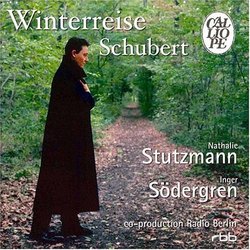| All Artists: Franz [Vienna] Schubert, Inger Sodergren Title: Schubert: Winterreise Members Wishing: 0 Total Copies: 0 Label: Calliope France Release Date: 8/10/2004 Album Type: Import Genres: Pop, Classical Styles: Vocal Pop, Opera & Classical Vocal Number of Discs: 1 SwapaCD Credits: 1 UPC: 794881746828 |
Search - Franz [Vienna] Schubert, Inger Sodergren :: Schubert: Winterreise
CD Details |
CD ReviewsUnforgettable moments here L. Gallagher | Los Angeles, CA United States | 09/20/2004 (4 out of 5 stars) "Where a work like "Winterreise" is concerned, there's little point to searching for the single best recorded performance. Dietrich Fischer-Dieskau's multiple recordings of Schubert's cycle prove the point: the real question concerns the range and depth of expression an artist can summon at a given stage of her or his career. It's a pity, for example, that Christa Ludwig's estimable interpretation was recorded so late in her career (1986) -- a lovely recording nonetheless, but not as powerful as it might have been ten years earlier. Nathalie Stutzmann's recording comes at what surely is her prime. In purely vocal terms, the performance is extraordinary. It's also very different from the style of perfomance heard in her Schumann series for RCA in the '90's. Here the sound is much more streamlined and austere, without losing the essential luxuriance of Stutzmann's deep contralto. It's almost as if the recent series of wonderful performances she has turned in for Robert King's Vivaldi series on Hyperion in the past few years has had an effect on her impressions of nineteenth-century lieder -- in "Winterreise" it is very much the voice of the Vivaldi recordings, rather than the earlier Schumann, that we hear: concentrated and ethereal, with sensitive but not fussy attention to the texts. Fans of Matthias Goerne (and I am one) will not want to part with either of his recordings, but Stutzmann's performance here is very special indeed, and one that fans of the French contralto will not want to miss. Her haunting version of the last song, "Der Leiermann," is worth the price of the disc." Among the Finest Winterreise Recordings Grady Harp | Los Angeles, CA United States | 09/22/2005 (5 out of 5 stars) "Nathalie Stutzmann possesses one of the richest true contralto voices before the public today. Though there are many mezzo-sopranos who are garnering attention for the lower range of the female voice, few can touch the sheer beauty of Stutzmann's timbre and vocal production. The depth of her tone is buttery and rich. Franz Schubert's WINTERREISE is well suited to this performer. While there are many fine recordings of this difficult but exquisitely beautiful song cycle, there always seems room for more. Many fine performers make us feel as though they own the cycle - Ian Bostridge, Matthias Goerne, Thomas Quasthoff, Dietrich Fischer-Dieskau, Brigitte Fassbaender to name only a few. Yet Stutzmann in collaboration with Inger Sodergren capture the poetry as well as anyone has. The entire cycle is simply some of the most beautiful singing on recording. Perhaps one way to appreciate the all the aspects of this Schubert masterwork is to have several recordings - by contralto, tenor, baritone, and bass. But if you are limited to only one, this recording will certainly inform and please. Highly recommended. Grady Harp, September 05" Profound and moving Ralph Moore | Bishop's Stortford, UK | 02/19/2009 (5 out of 5 stars) "This is one of the greatest - if not the greatest - of Romantic song cycles; the product of a remarkable combination of the talents of two young German speakers (Schubert being Austrian), both doomed to a premature death when barely into their thirties, one a poet, the other a composer - and both geniuses. It was the final recommendation on BBC Radio 3 "Record Review" last Saturday so I ordered it on the strength of the snippets played there and available on the Amazon website. I am sorry to see, therefore, that it is currently deleted; presumably Calliope will now rush to make it available once more.
There is always room for another "Winterreise" when the interpretation is of this quality. Stutzmann possesses a true contralto which sounds uncannily like a counter-tenor such as Andreas Scholl; the voice has rich, rounded, deep resonance but is also capable - as in the "Der Leiermann", for example - of assuming a blanched, almost vibrato-free tone to suggest desolation and emptiness. At other times, Stutzmann's voice rings out magnificently; she is very good at subtle gradations and variations. The enunciation of her German is, to my ears, impeccable, and she is sensitively accompanied by Inger Södergren, who gives the singer time without her playing ever sounding mannered. Just occasionally, I feel that Stutzmann's vibrato becomes a little too broad, but mostly she is a model of control. I part company with many in that I do not much enjoy the Germanic, slightly thin and throaty timbre of either Fischer-Dieskau or his protégé Matthias Görne but I realise that I am in a minority and there is room amongst so many recordings for the vagaries of taste. I much prefer the fuller voices of Christian Gerhaher, Thomas Allen or, best of all, the other notable modern female interpreter Brigitte Fassbänder, whose mezzo voice is tangier than Stutzmann's deep contralto and whose word-painting is even more vivid. Stutzmann is best in the more melancholy, benumbed numbers; Fassbänder excels in the more animated, stirring songs and her pianist, Aribert Reimann, is far more inclined to indulge in rubato and allow the singer freer phrasing. Perhaps, in any case, you need several different versions of this inexhaustible masterpiece of song cycles in order to begin to plumb its depths. You could do far worse than start with this one." |

